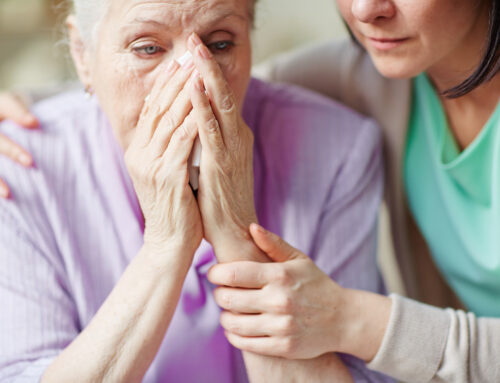I had a difficult time helping to care for my father, primarily because it represented one more ball thrown in the air for me to juggle during a time when I was struggling to achieve balance in my own life. Thankfully, I had the help of my two older sisters. However, in the early, inexperienced stages of our caregiving we did not develop an organized approach to his care. Subsequently, we often ended up duplicating each other’s efforts. I began to feel stressed out and overwhelmed, but I still thought I was doing okay until I had a meltdown at work. While leading our monthly physician group meeting, I began to share that I may have to reduce my hours for a while to help care for my father and I suddenly began to cry uncontrollably. I am forever indebted to one of my colleagues, who consoled me after the meeting and shared an invaluable caregiving pearl that literally changed my life. Had it not been for P.L., I’m sure I would have gone from being stressed to being burned out.
Caring for a loved one can be extremely stressful. Whether you’re single or married, childless or a parent, an only child or have multiple siblings, the added responsibility of caring for an ill spouse, family member or friend is associated with inevitable stress. A key difference between stress and burnout is your ability to recover. Stress causes temporary changes in our behavior and attitudes, but after some rest and recuperation we can reset and resume our lives in previous fashion. Burnout is the result of repeated stressors and ultimately represents an inability to “bounce back”. As a result, you become emotionally detached and begin to feel helpless.
According to WebMd, the following are signs of caregiver burnout:
- Withdrawal from friends and family
- Loss of interest in activities previously enjoyed
- Feeling blue, irritable, hopeless, and helpless
- Changes in appetite, weight, or both
- Changes in sleep patterns
- Getting sick more often
- Feelings of wanting to hurt yourself or the person for whom you are caring
- Emotional and physical exhaustion
- Excessive use of alcohol and/or sleep medications
- Irritability
There are several things that contribute to caregiver burnout. Attempting to be a “super caregiver” can lead to burnout. Like superheroes, caregivers are often thrust into problematic situations and we immediately set out to save the day. But without true superhero powers, you will find yourself emotionally and physically depleted. Caregivers without an opportunity to recharge will likely experience burnout. The “super caregiver” mentality will also cause you to set unrealistic expectations for yourself (and perhaps even for your loved one). When these goals are not accomplished the result is profound disappointment, which can lead to burnout. Feeling powerless is a significant contributor to caregiver burnout. Much of what happens is out of our control, which can cause feelings of sadness and hopelessness. If you’re experiencing burnout, it will be very difficult for you to be an effective caregiver. Your health and/or the health of your loved one will suffer.
Ideally, caregivers should strive to prevent burnout by engaging in the following activities:
- Set realistic expectations about your loved one’s illness and your ability to provide care. Understand and accept that perfection is not achievable.
- Educate yourself about your loved one’s illness. Being better informed will help you manage the expected complications and progression of disease.
- Talk about your feelings with your friends, significant other, family members, and others in your personal circle with whom you feel comfortable.
- Do not hesitate to seek assistance from a mental health professional, particularly if you are having feelings of hurting yourself or others.
The National Suicide Prevention Lifeline can be reached at 1-800-273-8255
- Practice self-care. Set aside time for yourself when possible. Prayer, meditation, reading, listening to soothing music, and taking a nap are just a few activities that can help you relax and recharge
- Pat yourself on the back. If your loved one has dementia or mental illness, they may not provide the positive feedback or the “thank you” you desperately need to hear. Acknowledge your small victories and understand that they appreciate you deeply, even if they can’t express it.
- Maintain your health by eating properly, getting an appropriate amount of sleep, and exercising.
- Explore respite care options in your area. Many assisted living facilities offer respite care for 1-2 days for an established fee.
- Ask for help! Trying to do this alone will take you on the fast track to burnout. While there are some caregivers who have very limited resources and find themselves having to do this alone, the reality for most of us is that we have not because we ask not.
- Allow others to help without micromanaging. Accept that others may not complete tasks in the exact manner that you do. Don’t alienate your helpers with unnecessary criticism.
Based on my extensive experience, I created a guide entitled, “Preventing Caregiver Burnout: How to Ask for Help”. It includes the life-changing suggestion provided by my colleague and several other tips that will help you get support from your “village” in effective, meaningful ways. Click here for your free printable download.
Caregiving is difficult, but it is also a rewarding experience and a gift to your loved ones. Caring for ourselves will allow us to care for others while minimizing the stress and preventing burnout.








Leave A Comment